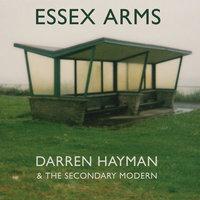|
|
Darren Hayman and the Secondary Modern
Essex Arms
Fortuna Pop
Article written by
Alex S - Aug 9, 2010
|
|
|

Darren Hayman - Essex Arms
|
I'm assuming you’re reading this for one of two reasons. You are already a fan of Hayman's work through Hefner, or The French, or his 'bluegrass indie supergroup' Hayman, Watkins, Trout and Lee or his two albums with The Secondary Modern. In which case you will be equally pleased with this offering. From the gentle harmonies of 'Be Lonely', a wonderfully melancholic opener, to the rousing finale 'Nothing You can Do About It' this is Hayman doing what he does best. Lo-fi, folksy indie-pop, tiny love songs delivered with charm and wit. If like me on the other hand, you are curious about his particular take on white working class communities through the lens of Essex, then there is a great deal more to say. He began this social commentary with Pram Town, an unflinching view of Harlow's inhabitants and has widened it here to take in the broader Essex landscape. Luckily for me, I like both Hayman and Essex, having been born and raised in Dagenham, or Romford, depending on where the council traced the district boundary in the annual schools lottery.
Two songs in and I am mildly irritated. 'The Vauxhall Novas are calling out your name again'; 'the satellite dishes are calling out your name again'. We've been here before. From the Jam's 'Saturdays Kids' to the Housemartins 'Sheep' we are invited once again to poke fun at the apparent failings of the white working class. Why is it that those who have escaped through education, or cultural enlightenment, or because they were never there in the first place, feel entitled to do this? The great lyricists of working class culture (Bragg, Springsteen, Cocker) take the ordinary and the mundane and turn it into something of beauty; celebrating culture with pride and dignity whilst also exposing the tragedies.
There's more of this dismissive tone in the next song "the Rayleigh boys will fuck up all of Southend" and I'm beginning to worry. 'Super Kings' is good though; rude, raw and funny and then we hit the stand-out gem on the album. Dagenham Ford - a song to stand alongside the work of this generation's finest working class poet, Alex Turner. More a town within a town than a factory, at its height Ford of Dagenham employed over 24,000 people. I remember my school career counselling boiling down to "what do you want to do at Ford's?" A production line that spawned the first strike led by Asian women this country had seen as well as the BNP. This song is beautiful, poetic, sensitive:
And the sparks that flew on the assembly line
And the panels beat in perfect time
We made large estates and sports saloons
And in our living rooms we watch the Hammers lose.
The insularity and attachment to place that defines the white working class, the noble values that have traditionally brought them together as a community; they are all witnessed and celebrated in this truly special song. There's more quality in 'Spiderman beats Ironman' and in 'Nothing you can do about it' is fast paced and funny. Overall though I'm disappointed. Not with what he's done, but with what he hasn't done. This is a fine album full of tender, sweet, well observed love songs. Whilst Essex provides the setting for these songs, the album does not offer the social commentary I was hoping for. Dagenham Ford aside, he fails to capture the contradictions at the heart of places like Essex or the cultural shifts that underpin suburban Britain.
For anyone interested in this kind of stuff, the best book written about the changing face of working class communities is Michael Collins' 'The Likes of Us', which centres on one square mile around Borough in South East London. And Bragg makes a decent fist of lifting Essex from the clichés of Essex girl jokes and excess bling in 'The Progressive Patriot'. This is a fine album and I was probably expecting too much, but given that Pram Town was a very specific statement about one particular place I thought we might see a deeper analysis here. Hey ho…
|
|
|
|
|
|



